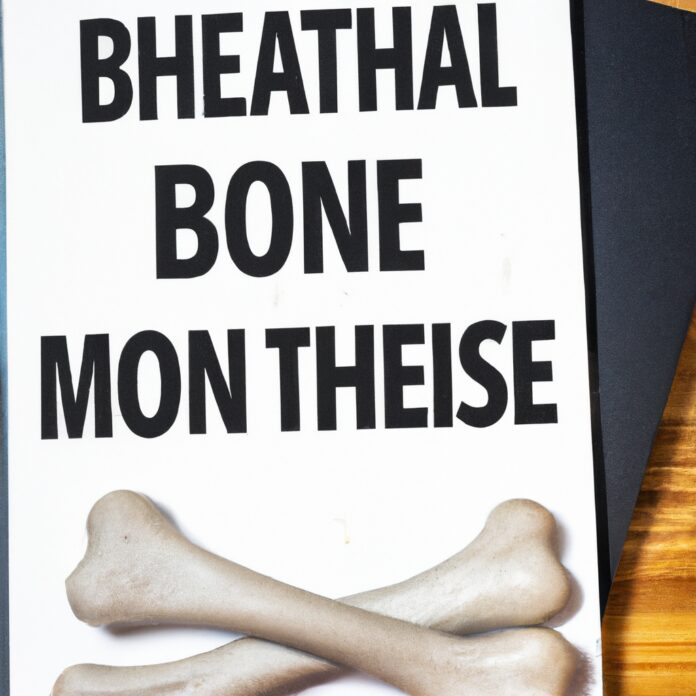With the ageing population, bone health in men is becoming more and more important. Preventing bone fracture and maintaining ability to function in old age is key. This article will explore the risks of osteoporosis and the strategies and evidence-based activities that men should take to help build and maintain strong and healthy bones for life.
1. Reaping the Benefits of Maintaining Healthy Bones
Maintaining healthy bones is a worthwhile endeavor, and one that can bring many benefits. Here are some of the top advantages of having strong bones:
- Longer Life Span: People with healthy bones are likely to live longer than those with weaker bones. Strong bones are the foundation for a strong body, allowing you to better fight off illnesses and disease.
- Greater Mobility: People with healthy bones can move with greater ease. This can lead to being able to take part in activities that wouldn’t be possible with weaker bones, such as participating in sports, going out for a hike, or playing skills games.
- Reduced Pain: Healthy bones also minimize the pain and discomfort that can often arise with weaker bones. People with strong bones are more likely to be free of chronic pain and can enjoy life with less pain and more enjoyment.
Taking the necessary steps to protect your bones and keep them strong doesn’t have to be a hassle. Eating foods high in calcium and Vitamin D, maintaining an active lifestyle, and getting enough rest are just some of the ways in which you can keep your bones in top shape. Additionally, weight bearing exercises and medications prescribed by qualified medical professionals can also help maintain your body’s bone mass.
In the end, it’s worth it to put in the effort to have healthy and strong bones. Eating correctly and maintaining proper physical activity can lead to a longer life and greater mobility while also reducing pain. Allowing you to participate in activities you can enjoy with people who mean the most to you.
2. How to Prevent Osteoporosis and Support Strength in Men
It can be easy to forget about men’s health, especially when it comes to osteoporosis. Osteoporosis, a condition that causes bones to become weak and brittle, has traditionally been thought of as a “woman’s disease”, yet men are also at risk. Here are some ways men can do to help prevent and manage osteoporosis, while also maintaining and improving strength:
- Eat calcium-rich foods. Calcium helps keep bones strong and healthy. Foods that are rich in calcium include dairy products, sesame seeds, kale, almonds and salmon.
- Get regular exercise. Exercise helps bones stay strong and healthy, as it increases flexibility and puts natural stress on the bones. Weight-bearing exercises like walking, running and weightlifting are particularly beneficial.
- Avoid smoking and excessive drinking. Smoking and drinking excessively interfere with the body’s ability to absorb calcium and can increase the risk of osteoporosis.
Men should also be aware that certain medications they may take could be causing their bones to weaken or be at risk for osteoporosis. These medications include PPIs, corticosteroids, antiseizure meds, and heparin. Talk to your doctor about any medications you are currently taking, and ask if there are other treatments available.
By making some simple lifestyle changes and staying aware of potential risks, men can stay strong and prevent osteoporosis. It’s never too late to start taking care of your bones!
3. Introduction to Bone Health and Nutritional Necessities
Humans need bones to support their bodies and enable movement, and healthy bones are extremely important. Unfortunately, they can deteriorate with age if not looked after properly. Fortunately, there are steps we can take to ensure our bones remain strong and healthy – and understanding what those steps involve is key.
Nutrition for Bone Health: Eating foods rich in calcium, phosphorus, magnesium, and vitamins D and K are essential for bone health. Dairy products such as low-fat milk, cheese, yogurt, and fortified orange juice are excellent sources of calcium. Leafy greens, legumes, tofu, sardines, and bony fish are also high in calcium. Vitamin D is often obtained from direct sunlight and fatty fish. Nuts, seeds, and whole grains are good sources of magnesium and phosphorus, and green vegetables, soybean oil, and egg yolks contain vitamin K.
Osteoporosis Prevention: In addition to eating a balanced, nutrient-rich diet, it is also important to get regular physical activity for bone health. Weight-bearing and resistance exercises, like walking, running, weight lifting, and stair climbing, help strengthen bone density and promote strong muscles and bones. It is also important to avoid habits that can negatively impact bone health, such as smoking and excessive drinking.
Supplements: Supplements can be an excellent addition to a healthy diet and lifestyle, especially for people who are at a higher risk of bone loss or may not be able to get the nutritional needs from their food. Calcium and vitamin D supplements are common for bone health and should be taken only after talking to a doctor.
4. Exercise: The Pillars of Bone Growth and Rejuvenation
When it comes to improving your bone health, exercise is a key factor for growing and rejuvenating your bones. Here are some key exercises you should incorporate into your daily routine to promote healthier bones.
Weight-bearing Exercises
- Jogging, brisk walking, stair or hill climbing
- Jumping rope
- Dancing, aerobics, or high-impact sports (such as soccer, basketball, and tennis)
Weight-bearing exercises help your bones get strong by strengthening your muscles and bones. They can help reduce your risk of developing osteoporosis later in life. Weight-bearing exercises can also help strengthen your joints, as well as improve your balance.
Strengthening Exercise
- Weightlifting
- Using resistance bands or dumbbells
- Push-ups
Strengthening exercises are important because they can help strengthen your bones and muscles. They can also help increase your range of motion and flexibility, and they can reduce your risk of injury. Strengthening exercises can help build muscle and protect your bones from any risks associated with age or physical inactivity.
5. Understanding the Risks of Bone Loss and Preserving Strength
Bone loss is a significant health problem that can lead to serious medical issues including fractures and arthritis. It is therefore important to learn the risks and understand how to prevent it. Here are a few tips for preserving your bone health and strength:
A Balanced Diet. The key to maintaining bone health is a nutrient-rich diet with adequate amounts of calcium, magnesium, phosphorus, and vitamin D. Eat a variety of foods from all five food groups and don’t get too hung up on specific foods that may be labeled as “bone-healthy.”
Regular Exercise. Exercise helps strengthen bones by increasing your strength and stamina. This can also reduce the risk of falls and lessen stress on your joints. Try activities such as walking, running, jogging, cycling, swimming, and yoga.
Use Supplements Carefully. Supplements can be helpful if you don’t get enough of the above mentioned minerals and vitamins from food. However, it is important to use them only when needed and only after consulting with your doctor.
Quit Smoking. Smoking has been linked to lower bone density, which increases the risk of fractures. If you are a smoker, seek help to quit smoking.
For the modern man, maintaining strong bones and preventing the onset of osteoporosis should be at the top of the priority list. Keeping fit, eating right and supplementing your calcium and vitamin D intake are all easy and essential steps that combine to create a lifetime of healthy bones. After all, a strong framework always translates to a strong man.





